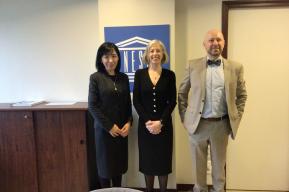News
National framework for teacher social dialogue launched in Zambia

Teacher’s participation in policy decisions is vital to find common solutions to problems and strengthen governance in education. Social dialogue can also help harmonize policy measures and improve cooperation between governments and the teachers who implement national policy and norms in the classroom. As such, effective social dialogue is key to guaranteeing quality education.
UNESCO’s Capacity Development for Education (CapED) Programme is supporting Zambia strengthen its social dialogues as part of its wider support towards the implementation of the country’s Comprehensive National Teacher Policy. In December 2022, UNESCO, through CapED, mobilized IICBA and the Teacher Task Force to support a national stakeholder meeting where the Minister of Education launched the National Framework for Social Dialogue for Teachers.
Speaking at the launch, the Minister indicated that the new framework was a significant milestone for Zambia explaining that it provides a platform for teachers to voice their concerns on issues affecting their professionalism, welfare and work conditions. The minister stated that the institutionalization of this framework in combination with the Standards of Practice for the Teaching Profession – which were developed in 2019 with CapED’s support - will result in teachers with greater motivation, improved ethical and professional status, as well as a democratization of teaching service delivery. “Social dialogue gives workers, through collective bargaining and consultation, a voice in the decision-making processes around issues affecting them. It is a valuable means of protecting and promoting the interests of workers by extending democracy and human dignity to the workplace” – Hon. Douglas Munsaka Syakalima.
One of the participants at the event was Fridah Mulembe, a teacher in the department of business studies at a technical vocational teachers’ college. During an interview with UNESCO, she explained the importance of social dialogue and stated that, “if you are to resolve certain conflicts you better come together, there must be dialogue…when teachers are involved certain issues are avoided.” She noted that social dialogue can lead to better teacher motivation, wellbeing meaning that teachers will be more likely to provide quality education. Mulembe also discussed the importance of inclusivity: “At the end of the day, women must be included, people with a disability must have a voice and if everyone is included there will be success.”
A representative from UNESCO Regional Office for Southern Africa stated that ‘’strong coordination mechanisms, the appreciation of social dialogue as well as a comprehensive teacher policy based on consultation and consensus are essential to support quality teachers that can lead to the transformation need to ensure that learners receive quality education relevant to today’s challenges”. – Julia Heiss, UNESCO.
The consultative meeting was also an opportunity for representatives from teacher unions, teacher training colleges, schools and other key stakeholders to reflect on how to better engage teachers in social dialogue and. An initial mapping of stakeholders who would be involved in the national teacher policy development processes took place.
With the framework now launched, the Teaching Council of Zambia – the body designated to institutionalize teacher social dialogue in Zambia – will pilot the framework based on the costed implementation plan in two Zambian provinces targeting 200 in-service teachers. The Pilot will provide a valuable opportunity to fine tune the implementation of the framework before it is rolled out nationwide.
- UNESCO’s Capacity Development for Education (CapED) Programme
- UNESCO’s work to support teachers







